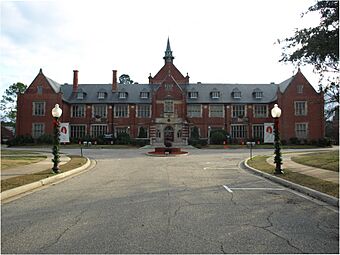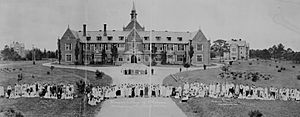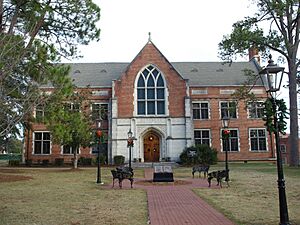Huntingdon College facts for kids
 |
|
|
Former names
|
Tuskegee Female College (1854–1872) Alabama Conference Female College (1872–1910) Woman's College of Alabama (1910–1935) |
|---|---|
| Motto | Enter to Grow in Wisdom, Go Forth to Apply Wisdom in Service. |
| Type | Private college |
| Established | February 2, 1854 |
|
Religious affiliation
|
United Methodist Church |
| President | Anthony Leigh |
|
Academic staff
|
58 |
| Students | 1,107 |
| Location |
,
U.S.
32°21′00″N 86°17′06″W / 32.350°N 86.285°W |
| Campus | Suburban Neighborhood |
| Colors | Scarlet & grey |
|
Sporting affiliations
|
NCAA Division III |
| Mascot | Hawks |
 |
|
|
Huntingdon College Campus Historic District
|
|

Flowers Memorial Hall was built in 1909
|
|
| Area | 58 acres (23 ha) |
| Architectural style | Late Gothic Revival, Tudor Revival |
| NRHP reference No. | 00000138 |
| Added to NRHP | February 24, 2000 |
Huntingdon College is a private college in Montgomery, Alabama. It is connected to the United Methodist Church. The school was founded in 1854, originally as a college just for women.
Contents
History of the College
Early Beginnings
Huntingdon College was officially created on February 2, 1854. At that time, it was called Tuskegee Female College and was located in Tuskegee, Alabama. Its first president, Andrew Adgate Lipscomb, wanted the school to be a great place for teaching.
In 1872, the college's name changed to Alabama Conference Female College. This was because it became officially part of the Methodist Church. After the Civil War, leaders decided to move the college to a bigger city to help it grow. They chose Montgomery, the capital of Alabama.
A New Home in Montgomery
In 1908, the college bought 58 acres of land in a neighborhood called Old Cloverdale. The beautiful campus grounds were designed by Frederick Law Olmsted Jr., the same person who helped design Central Park in New York City.
A strange event happened on August 24, 1909. The college moved all its books, furniture, and science equipment into a new building called Hamner Hall. That very night, the building burned down. This fire destroyed the school's records from its first 50 years.
Despite the fire, the college did not give up. A new main building, Flowers Memorial Hall, was finished in 1910. Its design was inspired by the famous old universities of Oxford and Cambridge in England. In the same year, the school was renamed the Woman's College of Alabama.
Becoming Huntingdon College
For many years, only women could attend the college. But after World War I, the school began to accept male students. The first man graduated in 1934. Since the school was no longer just for women, it needed a new name.
In 1935, it was renamed Huntingdon College. This was to honor Selina, Countess of Huntingdon, an important woman who supported the Methodist movement.
Today, Huntingdon is a growing college with over 50 subjects to study. It has also become known for its growth, with student numbers increasing by a large amount between 2002 and 2012.
Campus and Buildings
The Huntingdon College campus is so special that it's listed on the National Register of Historic Places. This means its buildings are considered important to American history. The campus has 13 main buildings designed in a style called Gothic Revival, which makes them look like old castles or cathedrals.
College Sports
Huntingdon College's sports teams are called the Hawks. They compete in Division III of the National Collegiate Athletic Association (NCAA). This means they play against other small colleges.
The Hawks are part of the Collegiate Conference of the South (CCS).
- Men's sports include baseball, basketball, football, golf, lacrosse, soccer, tennis, and wrestling.
- Women's sports include basketball, beach volleyball, golf, lacrosse, soccer, softball, tennis, and volleyball.
Huntingdon is the only four-year college in Alabama that has a wrestling team.
The Ghost of the "Red Lady"
A famous story at Huntingdon College is about a ghost known as the "Red Lady." Legend says she is the spirit of a student from the early 1900s. People say she haunts one of the dorms, Pratt Hall.
Famous People from Huntingdon
Many well-known people have studied at Huntingdon College. Here are a few of them:
- Leura Canary (1978) – A lawyer who served as a U.S. Attorney.
- Joe Durant (1987) – A professional golfer.
- Leila Herbert – An author.
- Harper Lee (attended 1944-1945) – The famous author of the novel To Kill a Mockingbird.
- Jeff Sessions (1969) – An attorney and politician who was a U.S. Senator and the U.S. Attorney General.
- Bob Zellner (attended 1957-1961) – An important activist in the Civil Rights Movement.
- Kathryn Tucker Windham (1939) – A writer and storyteller.
 | Emma Amos |
 | Edward Mitchell Bannister |
 | Larry D. Alexander |
 | Ernie Barnes |



